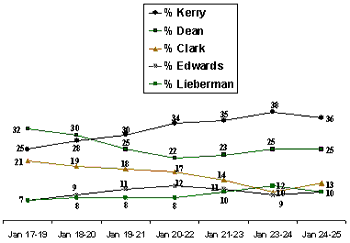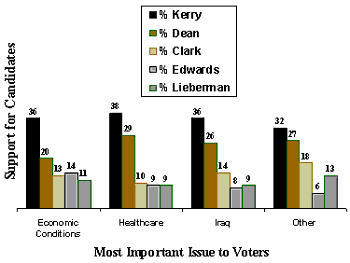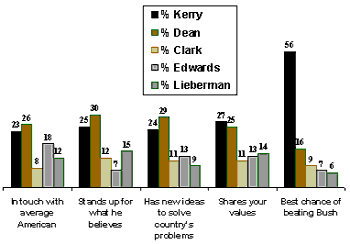PRINCETON, NJ -- Massachusetts Sen. John Kerry is poised to win the New Hampshire Democratic primary this Tuesday, according to the final 2004 CNN/USA Today/Gallup tracking poll of likely voters. Widely perceived by voters as the most likely candidate to beat President George W. Bush in the November general election, Kerry leads former Vermont Gov. Howard Dean 36% to 25%.
| Likely New Hampshire Voters: If the Primary Were Held Today, for Whom Would You Vote? |
 |
In a virtual tie for third place, well behind Dean, are retired Gen. Wesley Clark with 13% of the vote, and Sens. John Edwards (North Carolina) and Joe Lieberman (Connecticut), each with 10% support. Ohio Rep. Dennis Kucinich and civil rights activist Al Sharpton each garner 1% of the vote, with another 4% still undecided.
With more than a day remaining between the end of interviewing and the actual vote, campaign efforts could cause these numbers to change. But barring a major revelation or event affecting perceptions of the candidates, the final vote is likely to be close to the percentages reported here.
Prior to the announcement of the Iowa caucuses results, Dean led Kerry by a 7-point margin, with Clark trailing Kerry by just 4 points. But three days later, based on interviews conducted after the Iowa contest, the tracking poll showed Kerry with a gain of 9 points and Dean a loss of 10, giving Kerry a 12-point lead, 34% to 22%. Kerry's margin has varied only slightly since then, from 13 points to his current 11-point margin.
In the same period of time, Clark lost 8 points, while Lieberman and Edwards each gained 3 points, leaving all three of these candidates virtually tied for third.
Best Chance of Beating Bush, Not Issues, Propelled Kerry to Front-Runner Position
Although voters cite different issues as the most important to their vote, these do not relate very strongly to people's vote intentions. Overall, 38% of Democratic voters say the economy is the most important issue influencing their primary vote, with another 26% choosing healthcare and 20% the situation in Iraq. Another 16% cite other issues -- 4% terrorism, 5% taxes, and 7% some other unnamed issue. But Kerry comes in first and Dean second among all four groups of voters.
| Support for Candidates Compared by Which Issue Is Most Important to Voters |
 |
There are some variations, but among voters who select each of the three major issues -- the economy, healthcare, and Iraq -- as most important in deciding for whom to vote, Kerry beats Dean by margins of 9 to 16 percentage points. Dean in turn beats his next closest challenger by anywhere from 6 to 19 percentage points among each of these three groups.
Among voters choosing some "other" issue as most important (there were too few people citing taxes, terrorism, or another unnamed issue to analyze each separately), Kerry also comes in first, by 5 percentage points, and Dean comes in second by 9 points.
These results suggest that issues are not the dominant influence determining which candidates are coming in first and second.
Character Traits Not Dominant Either -- Except Perceived Ability to Beat Bush
Likely New Hampshire Democratic primary voters were asked to select which of the candidates was described best by each of five personal traits. On four of the traits -- being in touch with the average American, standing up for what the candidate believes in, having new ideas to help solve the country's problems, and sharing the values of voters -- Dean and Kerry are highly competitive. In fact, despite his deficit to Kerry on the overall ballot, Dean leads slightly on three of them and trails slightly on the other.
| Phrase Describes Which Candidate the Best? |
 |
But on one item, Kerry is the overwhelming winner -- perception as having the best chance to beat Bush in the November election.
The question about having the best chance of beating Bush was not asked of New Hampshire voters prior to the Iowa caucuses, so there is no direct comparison of how Dean and Kerry fared on this measure before Kerry's victory and Dean's "screaming" concession speech. Still, it is not unreasonable to assume that prior to these events, when Dean was leading in some New Hampshire polls by more than 20 percentage points, that Democratic voters in this state had a much more optimistic view of Dean's potential chances against Bush than they do now.
Some evidence for the negative impact of the now famous concession speech on Dean's fortunes comes from the current poll, which shows that 90% of all likely voters said they had heard or seen replays of the speech, for an average of 11 times (10 times if those who had not heard the speech are also counted).
How many times, if any, would you estimate that you heard or saw the speech Howard Dean gave to his supporters after the Iowa caucuses?
|
|
|
|
|
|
21 or more |
No answer |
|
|
|
9% |
42 |
21 |
13 |
5 |
9 |
1 |
10.2 |
5 |
And 30% of all voters said the speech raised serious doubts in their minds that Dean could be a good candidate for president.
Did this speech raise serious doubts in your mind that Howard Dean can be a good candidate for president, or did it not affect your view of him?
|
Yes, raised |
No, did not |
No |
|
30% |
69 |
1 |
Among people who said the speech had no effect on their view of Dean, Kerry and Dean essentially tie -- 33% say they will vote for Kerry, 32% for Dean. But among those who said the speech did raise doubts, Kerry wins with 44% of the vote, while Clark (15%), Edwards (13%), and Lieberman (13%) all get more votes than Dean (9%).
These results suggest that had Dean lost Iowa, but not given his controversial concession speech, the contest in New Hampshire might be considerably more competitive.
Independents Versus Democrats
Both registered Democrats and independents are allowed to vote in the New Hampshire Democratic primary, and since there is no competitive Republican primary this year (President Bush is the presumed nominee), it is anticipated that many independents may vote in the Democratic primary on Tuesday, in part because of the high visibility of the race.
The final CNN/USA Today/Gallup poll indicates only a slight difference in the Kerry/Dean margin between Democrats and independents planning on voting in the primary. Kerry wins by 14 points among Democrats (44% to 30%) and 11 points among independents (31% to 20%).
Though the Kerry/Dean margins are similar in both groups, independents are more likely than registered Democrats to vote for Clark, Lieberman, and Edwards -- making these candidates somewhat more competitive with Dean than they would be if independents were not allowed to vote.
Survey Methods
New Hampshire tracking results are based on telephone interviews with New Hampshire residents who say they plan to vote in the Democratic Primary on Jan. 27. The nightly number of interviews was 280 from Jan. 17-23 and approximately 600 on Jan. 24-25. Results are reported in three-day or two-day rolling averages.
The most recent results are based on interviews conducted Jan. 24-25, 2004 with 970 New Hampshire residents deemed most likely to vote in the Democratic primary. For this sample, the maximum margin of error attributable to sampling is ±3 percentage points.
The "likely voter" model assumes a turnout rate of 60% of those who say they plan to vote in the Democratic presidential primary, approximately 25% of New Hampshire adults. The likely voter results are weighted to match this assumption (weighted sample size is 720).
All results reported here are based on likely voters.
|
Number of Interviews |
||||
|
Plan to vote in |
Likely |
Margin of error, |
||
|
2004 Jan 24-25 |
1,209 |
970 |
±3 |
|
|
2004 Jan 23-24 |
893 |
688 |
±4 |
|
|
2004 Jan 21-23 |
853 |
641 |
±4 |
|
|
2004 Jan 20-22 |
848 |
641 |
±4 |
|
|
2004 Jan 19-21 |
852 |
646 |
±4 |
|
|
2004 Jan 18-20 |
849 |
644 |
±4 |
|
|
2004 Jan 17-19 ^ |
854 |
657 |
±4 |
|
|
^ |
NOTE: All interviews conducted on Jan. 19 were completed before the results of the Iowa caucuses were reported. |
|||
In addition to sampling error, question wording and practical difficulties in conducting surveys can introduce error or bias into the findings of public opinion polls.
2. Suppose the Democratic primary for president were being held today. If you had to choose among the following candidates, which candidate would you vote for? [ROTATED: John Kerry, Joe Lieberman, John Edwards, Howard Dean, Al Sharpton, Dennis Kucinich, or Wesley Clark]
As of today, to which Democratic candidate do you lean most?
|
|
|
|
Lieb- |
Ed- |
Kuc- |
Sharp- |
None/ other/ no opinion |
||
|
% |
% |
% |
% |
% |
% |
% |
% |
||
|
(LV) 2004 Jan 24-25 |
36 |
25 |
13 |
10 |
10 |
1 |
1 |
4 |
|
|
(LV) 2004 Jan 23-24 |
38 |
25 |
10 |
12 |
9 |
2 |
* |
4 |
|
|
(LV) 2004 Jan 21-23 |
35 |
23 |
14 |
10 |
11 |
3 |
* |
4 |
|
|
(LV) 2004 Jan 20-22 |
34 |
22 |
17 |
8 |
12 |
3 |
* |
4 |
|
|
(LV) 2004 Jan 19-21 ^ |
30 |
25 |
18 |
8 |
11 |
4 |
* |
4 |
|
|
(LV) 2004 Jan 18-20 ^ |
28 |
30 |
19 |
8 |
9 |
2 |
* |
4 |
|
|
(LV) 2004 Jan 17-19 ^ |
25 |
32 |
21 |
7 |
7 |
2 |
1 |
5 |
|
|
^ |
Dick Gephardt dropped out of the race for the Democratic nomination on Jan. 20 and his name is removed from this question beginning with that date's interviewing. For data collected on Jan. 17, 18, and 19, Gephardt voters' second choice is substituted. Gephardt received 4% of the vote in the Jan. 17-19 poll. |
||||||||
|
(LV) Likely voters |
|||||||||
|
* Less than 0.5% |
|||||||||
3. Are you certain to vote for -- [INSERT RESPONSE FROM Q.2] -- in the primary election, or do you think you might change your mind?
BASED ON 895 LIKELY PRIMARY VOTERS WITH A CANDIDATE PREFERENCE
|
Certain to vote for |
Might change mind |
No opinion |
|
|
% |
% |
% |
|
|
(LV) 2004 Jan 24-25 |
71 |
28 |
1 |
|
(LV) 2004 Jan 23-24 |
71 |
28 |
1 |
|
(LV) 2004 Jan 21-23 |
63 |
36 |
1 |
|
(LV) 2004 Jan 20-22 |
62 |
37 |
1 |
|
(LV) 2004 Jan 19-21 |
63 |
36 |
1 |
|
(LV) 2004 Jan 18-20 |
64 |
35 |
1 |
|
(LV) 2004 Jan 17-19 |
62 |
37 |
1 |
|
(LV) Likely voters |
|||
6. Which ONE of the following issues is MOST important to you when you think about your vote in the primary this year -- [ROTATED: economic conditions, healthcare, the situation in Iraq, terrorism, (or) taxes]?
|
|
Health- |
The situation |
Terror- |
Taxes |
Other/ none/ |
|
|
(LV) 2004 Jan 24-25 |
38% |
26 |
20 |
4 |
5 |
7 |
|
(LV) 2004 Jan 20-22 |
38% |
31 |
17 |
6 |
4 |
4 |
|
(LV) Likely voters |
||||||
9. Next, I'm going to read a list of characteristics a president might have. For each one, please tell me, regardless of which candidate you support, whether it applies most to -- [ROTATED: Wesley Clark, Howard Dean, John Edwards, John Kerry, Joe Lieberman, Dennis Kucinich, (or) Al Sharpton]. How about -- [RANDOM ORDER]?
A. Is in touch with the average American
|
|
|
Ed- |
|
Lieb- |
Kuc- |
Sharp- |
All equally/ no opinion |
|
|
(LV) 2004 Jan 24-25 |
8% |
26 |
18 |
23 |
12 |
4 |
2 |
7 |
B. Has the best chance of beating George W. Bush in November
|
|
|
Ed- |
|
Lieb- |
Kuc- |
Sharp- |
All equally/ no opinion |
|
|
(LV) 2004 Jan 24-25 |
9% |
16 |
7 |
56 |
6 |
* |
* |
6 |
C. Stands up for what he believes in
|
|
|
Ed- |
|
Lieb- |
Kuc- |
Sharp- |
All equally/ no opinion |
|
|
(LV) 2004 Jan 24-25 |
12% |
30 |
7 |
25 |
15 |
4 |
* |
7 |
D. Shares your values
|
|
|
Ed- |
|
Lieb- |
Kuc- |
Sharp- |
All equally/ no opinion |
|
|
(LV) 2004 Jan 24-25 |
11% |
25 |
13 |
27 |
14 |
3 |
1 |
6 |
E. Has new ideas that would help solve the country's problems
|
|
|
Ed- |
|
Lieb- |
Kuc- |
Sharp- |
All equally/ no opinion |
|
|
(LV) 2004 Jan 24-25 |
11% |
29 |
13 |
24 |
9 |
5 |
1 |
8 |
|
(LV) Likely voters |
||||||||
On another topic,
10. How many times, if any, would you estimate that you heard or saw the speech Howard Dean gave to his supporters after the Iowa caucuses?
|
|
|
|
|
|
21 or more |
No answer |
|
|
|
|
(LV) 2004 Jan 24-25 |
9% |
42 |
21 |
13 |
5 |
9 |
1 |
10.2 |
5 |
11. Did this speech raise serious doubts in your mind that Howard Dean can be a good candidate for president, or did it not affect your view of him?
|
Yes, raised |
No, did not |
No |
|
|
(LV) 2004 Jan 24-25 |
30% |
69 |
1 |
|
(LV) Likely voters |
|||
